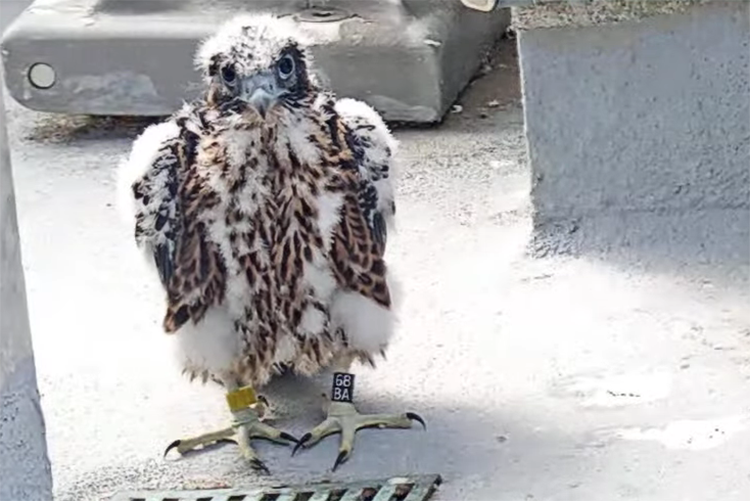Meet Zephyr, Luna and Rosa: UC Berkeley’s new falcon chicks get named
Children proposed two of the winners in the naming contest; nearly 3,700 people cast votes.
May 12, 2023

Rosa, on the left, has red tape on one leg band; her sister Luna, in the middle, wears blue; and brother Zephyr sports yellow. (Cal Falcons image)
The names Zephyr, Rosa and Luna are the winners of a contest launched earlier this week that asked the public what to call UC Berkeley’s three new peregrine falcon chicks, offspring of parents Annie and Lou. Nearly 3,700 people cast votes for their three favorite names off a list of 15 finalists released on Tuesday by Cal Falcons.
Originally, more than 2,000 different names were suggested; Cal Falcons biologists and librarians at the Berkeley Public Library whittled it down from there.
The name Zephyr, given to the only male chick, was the No. 1 choice, with 1,209 votes. One of the two females is now called Luna; her name received 1,021 votes. The largest female’s new name, Rosa, garnered 994.

This pie chart shows how close the votes were. (Cal Falcons image)
“Ursula just barely missed the cut, with 976 votes, after being first or second much of the competition,” said Sean Peterson, an environmental biologist with Cal Falcons. “We’ve never had a race as close as this one.”
A fun fact in this competition is that children suggested two of the three winning names, and that’s a first in the contest’s seven year history. Rosa, proposed by an 11-year-old boy, is for Rosa Scrivner (1851-1914), the first woman to receive an academic degree from the University of California. Luna, which means “moon” in Latin, was a popular name suggested by six children, ages 6 to 12.
As for how Cal Falcons decided which bird would get which name, Peterson said that this year the group decided to use as a guide the colors of the tape placed on the chicks’ legs, as a way to differentiate them from each other, when they received identification bands on May 5.

Zephyr, the male chick, was “pretty quick to leave the nest, similar to Rosa,” said Sean Peterson, an environmental biologist with Cal Falcons. (Cal Falcons image)
“Typically, we’ll ask the person who suggested the winning names,” he said. “However, this year, two of the winners were kids votes, and we don’t have any contact info for them, so we went with names thematic of the chicks’ band colors. So, Rosa has a red band, like a red rose; Luna has a blue band, like a blue moon; and that left Zephyr, for yellow.”
The name Zephyr, means a light wind, or a west wind, and comes from the name Zephyrus, the Greek god or personification of the west wind.
In their gravel nest box on Berkeley’s Campanile, the chicks — hatched in April — are rapidly shedding all their white, downy fluff and acquiring brown speckled wing and tail feathers, as they head toward learning to fly. Peterson said their personalities also are emerging.

Rosa, left, and her sister Luna, show off their new dark wing and tail feathers; their original white downy fluff is falling out. (Cal Falcons image)
“Rosa, in addition to being the largest, seems to be the most curious and adventurous of the chicks. She has been exploring quite a bit and has even hunted a moth already,” he said, adding that she was the first to leave the nest, “much like her namesake was the first woman to graduate UC Berkeley.”
Luna seems a little more quiet, said Peterson, “but that could also be because she appears to be the youngest.
“Zephyr was pretty quick to leave the nest, similar to Rosa. All three have been having a lot of fun exploring the tower lately. It’s very fun to watch.”

On a recent morning, Annie, who has resumed hunting for her chicks’ meals, zoomed in to check on their status. (Photo by Bridget Ahern)
Annie, who arrived on campus in late 2016, has now raised 18 chicks, making this year’s young Nos. 16, 17 and 18. Two of the 18 have died — Lux in 2017 and Lindsay in 2022 — and one, Sequoia, had been nesting atop San Jose City Hall, but hasn’t been since since late March, when his mate, Shasta, died of avian flu.
A fierce mother, Annie recently got aggressive with a juvenile male falcon who landed on the tower for a look around, possibly in hopes of claiming the territory. “She chased him back and forth across the tower,” said Peterson. “Luckily, he didn’t seem too interested in the area and hasn’t been seen since.”

The three chicks like to sleep in a heap in their gravel nest box. It’s hard to tell one from the other in this formation. (Cal Falcons image)
Not too long from now, on May 21, so-called Fledge Watch — when the young falcons spread their wings and practice taking flight off the bell tower — is expected to begin.
“So, we still have about nine days, about two weeks,” said Peterson, “to enjoy the chicks on the tower before they start to fly.” You can watch the falcon family 24/7 via three webcams on the Campanile.